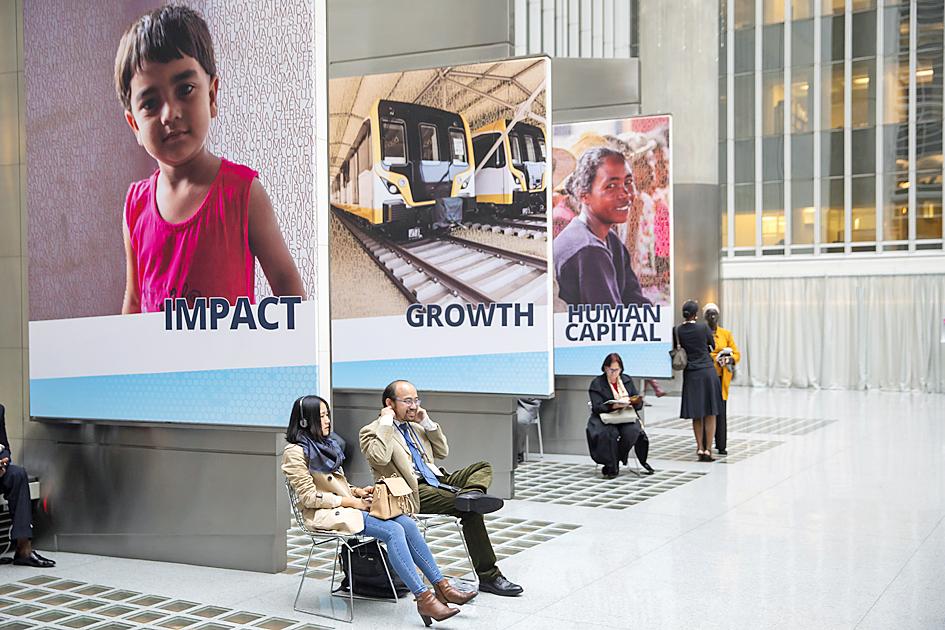World Bank chief economist Carmen Reinhart earlier this week said that the COVID-19 pandemic is turning into a major economic crisis and warned of the possibility of a financial crisis emerging.
“This did not start as a financial crisis, but it is morphing into a major economic crisis, with very serious financial consequences,” Reinhart said. “There’s a long road ahead.”
Reinhart, who took her new role in June, is best known for her work with Kenneth Rogoff, a professor at Harvard University, on the last financial crisis in their 2009 book This Time Is Different: Eight Centuries of Financial Folly.

Photo: EPA-EFE
It made the pair the go-to resource on the history of government defaults, recessions, bank runs, currency sell-offs, and inflationary spikes.
Asked whether central banks buying bonds to keep yields low is ultimately a zero-sum game when everyone is doing it, Reinhart said: “This is a war. During wars governments finance their war expenditures however they can, and right now there are dire needs.”
“The scenario we are in is not a sustainable one,” she added.
Reinhart made the remarks after the world’s richest nations agreed to renew a debt relief initiative for the poorest countries through at least the first half of next year, falling short of the World Bank’s call for a full-year extension.
China is owed almost 60 percent of the money that the world’s poorest nations would be due to repay this year, World Bank data showed.
It has made many loans to developing countries with terms that are not transparent and at higher interest rates than the nations can afford, World Bank president David Malpass said in August.
Asked about China not participating in the debt relief initiative, Reinhart said that Beijing was in fact involved, just “less than fully.”
The China Development Bank, a major lender, has not joined the effort, nor have private sector creditors, she said.
“Full participation is something we should strive for but unfortunately haven’t yet seen,” Reinhart added.

Merida Industry Co (美利達) has seen signs of recovery in the US and European markets this year, as customers are gradually depleting their inventories, the bicycle maker told shareholders yesterday. Given robust growth in new orders at its Taiwanese factory, coupled with its subsidiaries’ improving performance, Merida said it remains confident about the bicycle market’s prospects and expects steady growth in its core business this year. CAUTION ON CHINA However, the company must handle the Chinese market with great caution, as sales of road bikes there have declined significantly, affecting its revenue and profitability, Merida said in a statement, adding that it would

MARKET LEADERSHIP: Investors are flocking to Nvidia, drawn by the company’s long-term fundamntals, dominant position in the AI sector, and pricing and margin power Two years after Nvidia Corp made history by becoming the first chipmaker to achieve a US$1 trillion market capitalization, an even more remarkable milestone is within its grasp: becoming the first company to reach US$4 trillion. After the emergence of China’s DeepSeek (深度求索) sent the stock plunging earlier this year and stoked concerns that outlays on artificial intelligence (AI) infrastructure were set to slow, Nvidia shares have rallied back to a record. The company’s biggest customers remain full steam ahead on spending, much of which is flowing to its computing systems. Microsoft Corp, Meta Platforms Inc, Amazon.com Inc and Alphabet Inc are

RISING: Strong exports, and life insurance companies’ efforts to manage currency risks indicates the NT dollar would eventually pass the 29 level, an expert said The New Taiwan dollar yesterday rallied to its strongest in three years amid inflows to the nation’s stock market and broad-based weakness in the US dollar. Exporter sales of the US currency and a repatriation of funds from local asset managers also played a role, said two traders, who asked not to be identified as they were not authorized to speak publicly. State-owned banks were seen buying the greenback yesterday, but only at a moderate scale, the traders said. The local currency gained 0.77 percent, outperforming almost all of its Asian peers, to close at NT$29.165 per US dollar in Taipei trading yesterday. The

The US overtaking China as Taiwan’s top export destination could boost industrial development and wage growth, given the US is a high-income economy, an economist said yesterday. However, Taiwan still needs to diversify its export markets due to the unpredictability of US President Donald Trump’s administration, said Chiou Jiunn-rong (邱俊榮), an economics professor at National Central University. Taiwan’s exports soared to a record US$51.74 billion last month, driven by strong demand for artificial intelligence (AI) products and continued orders, with information and communication technology (ICT) and audio/video products leading all sectors. The US reclaimed its position as Taiwan’s top export market, accounting for